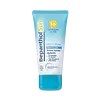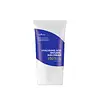What's inside
What's inside
 Key Ingredients
Key Ingredients

 Benefits
Benefits

 Concerns
Concerns

 Ingredients Side-by-side
Ingredients Side-by-side

Water
Skin ConditioningOctocrylene
UV AbsorberC12-15 Alkyl Benzoate
AntimicrobialButyl Methoxydibenzoylmethane
UV AbsorberEthylhexyl Salicylate
UV AbsorberMethylpropanediol
SolventDibutyl Adipate
EmollientPhenylbenzimidazole Sulfonic Acid
UV AbsorberDistarch Phosphate
AbsorbentPotassium Cetyl Phosphate
EmulsifyingBis-Ethylhexyloxyphenol Methoxyphenyl Triazine
Skin ConditioningPanthenol
Skin ConditioningVp/Eicosene Copolymer
Ethylhexyl Triazone
UV AbsorberStearyl Dimethicone
EmollientGlyceryl Stearate
EmollientPEG-100 Stearate
Diethylhexyl Syringylidenemalonate
Skin ProtectingSorbitan Stearate
EmulsifyingCaprylyl Glycol
EmollientArgilla
AbrasiveSodium Hydroxide
BufferingOctadecene
SolventXanthan Gum
EmulsifyingTocopherol
AntioxidantPhenylpropanol
MaskingWater, Octocrylene, C12-15 Alkyl Benzoate, Butyl Methoxydibenzoylmethane, Ethylhexyl Salicylate, Methylpropanediol, Dibutyl Adipate, Phenylbenzimidazole Sulfonic Acid, Distarch Phosphate, Potassium Cetyl Phosphate, Bis-Ethylhexyloxyphenol Methoxyphenyl Triazine, Panthenol, Vp/Eicosene Copolymer, Ethylhexyl Triazone, Stearyl Dimethicone, Glyceryl Stearate, PEG-100 Stearate, Diethylhexyl Syringylidenemalonate, Sorbitan Stearate, Caprylyl Glycol, Argilla, Sodium Hydroxide, Octadecene, Xanthan Gum, Tocopherol, Phenylpropanol
Water
Skin ConditioningZinc Oxide
Cosmetic ColorantButyloctyl Salicylate
Skin ConditioningPropylheptyl Caprylate
EmollientButylene Glycol
HumectantIsododecane
EmollientC15-19 Alkane
SolventDisiloxane
Skin ConditioningCetyl Diglyceryl Tris(Trimethylsiloxy)Silylethyl Dimethicone
Emulsion StabilisingCaprylyl Methicone
Skin ConditioningSodium Chloride
MaskingTriethylhexanoin
MaskingSodium Hyaluronate
HumectantGlycerin
HumectantMethyl Methacrylate Crosspolymer
Disteardimonium Hectorite
StabilisingTriethoxycaprylylsilane
Polymethylsilsesquioxane
1,2-Hexanediol
Skin ConditioningLauryl Polyglyceryl-3 Polydimethylsiloxyethyl Dimethicone
Skin ConditioningPolyglyceryl-2 Dipolyhydroxystearate
Skin ConditioningLauryl Dimethicone/Polyglycerin-3 Crosspolymer
CleansingCaprylyl Glycol
EmollientGlyceryl Caprylate
EmollientDipropylene Glycol
HumectantTocopherol
AntioxidantSodium Citrate
BufferingBetaine
HumectantInositol
HumectantPanthenol
Skin ConditioningWater, Zinc Oxide, Butyloctyl Salicylate, Propylheptyl Caprylate, Butylene Glycol, Isododecane, C15-19 Alkane, Disiloxane, Cetyl Diglyceryl Tris(Trimethylsiloxy)Silylethyl Dimethicone, Caprylyl Methicone, Sodium Chloride, Triethylhexanoin, Sodium Hyaluronate, Glycerin, Methyl Methacrylate Crosspolymer, Disteardimonium Hectorite, Triethoxycaprylylsilane, Polymethylsilsesquioxane, 1,2-Hexanediol, Lauryl Polyglyceryl-3 Polydimethylsiloxyethyl Dimethicone, Polyglyceryl-2 Dipolyhydroxystearate, Lauryl Dimethicone/Polyglycerin-3 Crosspolymer, Caprylyl Glycol, Glyceryl Caprylate, Dipropylene Glycol, Tocopherol, Sodium Citrate, Betaine, Inositol, Panthenol
 Reviews
Reviews

Ingredients Explained
These ingredients are found in both products.
Ingredients higher up in an ingredient list are typically present in a larger amount.
Caprylyl Glycol is a humectant and emollient, meaning it attracts and preserves moisture.
It is a common ingredient in many products, especially those designed to hydrate skin. The primary benefits are retaining moisture, skin softening, and promoting a healthy skin barrier.
Though Caprylyl Glycol is an alcohol derived from fatty acids, it is not the kind that can dry out skin.
This ingredient is also used as a preservative to extend the life of products. It has slight antimicrobial properties.
Learn more about Caprylyl GlycolPanthenol is a common ingredient that helps hydrate and soothe the skin. It is found naturally in our skin and hair.
There are two forms of panthenol: D and L.
D-panthenol is also known as dexpanthenol. Most cosmetics use dexpanthenol or a mixture of D and L-panthenol.
Panthenol is famous due to its ability to go deeper into the skin's layers. Using this ingredient has numerous pros (and no cons):
Like hyaluronic acid, panthenol is a humectant. Humectants are able to bind and hold large amounts of water to keep skin hydrated.
This ingredient works well for wound healing. It works by increasing tissue in the wound and helps close open wounds.
Once oxidized, panthenol converts to pantothenic acid. Panthothenic acid is found in all living cells.
This ingredient is also referred to as pro-vitamin B5.
Learn more about PanthenolTocopherol (also known as Vitamin E) is a common antioxidant used to help protect the skin from free-radicals and strengthen the skin barrier. It's also fat soluble - this means our skin is great at absorbing it.
Vitamin E also helps keep your natural skin lipids healthy. Your lipid skin barrier naturally consists of lipids, ceramides, and fatty acids. Vitamin E offers extra protection for your skin’s lipid barrier, keeping your skin healthy and nourished.
Another benefit is a bit of UV protection. Vitamin E helps reduce the damage caused by UVB rays. (It should not replace your sunscreen). Combining it with Vitamin C can decrease sunburned cells and hyperpigmentation after UV exposure.
You might have noticed Vitamin E + C often paired together. This is because it is great at stabilizing Vitamin C. Using the two together helps increase the effectiveness of both ingredients.
There are often claims that Vitamin E can reduce/prevent scarring, but these claims haven't been confirmed by scientific research.
Learn more about TocopherolWater. It's the most common cosmetic ingredient of all. You'll usually see it at the top of ingredient lists, meaning that it makes up the largest part of the product.
So why is it so popular? Water most often acts as a solvent - this means that it helps dissolve other ingredients into the formulation.
You'll also recognize water as that liquid we all need to stay alive. If you see this, drink a glass of water. Stay hydrated!
Learn more about Water